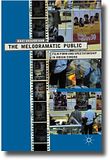The Melodramatic Public
Vasudevan, Ravi:
The melodramatic public : film form and spectatorship in Indian cinema / by Ravi Vasudevan. - New York, NY [u.a.] : Palgrave Macmillan, 2011. - XVII, 457 S.
ISBN 0-230-24764-4 / 978-0-230-24764-2
US$ 105,00 / £ 65,00
DDC 791.430954
Beschreibung
What does it mean to say Indian movies are melodramatic? How do film audiences engage with socio-political issues? What role has cinema played in the emergence of new economic forms, consumer cultures and digital technologies in a globalizing India? Ravi Vasudevan addresses these questions in a wide-ranging analysis of Indian cinema. [Verlagsinformation]
Inhalt
Introduction
The Melodramatic Public
PART I: MELODRAMATIC AND OTHER PUBLICS
- Shifting Codes, Dissolving Identities: Realist Art Cinema Criticism and Popular Film Form
- The Politics of Cultural Address in a 'Transitional' Cinema
- Neither State Nor Faith: Mediating Sectarian Conflict in Popular Cinema
- A Modernist Public: The Double Take of Modernism in the Work of Satyajit Ray
PART II: CINEMA AND TERRITORIAL IMAGINATION IN THE SUBCONTINENT: TAMILNADU AND INDIA
- Voice, Space, Form: the Symbolic and Territorial Itinerary of Mani Rathnams Roja (1992)
- Bombay (Mani Rathnam, 1995) and Its Publics
- Another History Rises to the Surface: Melodrama in the Age of Digital Simulation: Hey Ram! (Kamalahasan, 1999)
PART III: MELODRAMA MUTATED AND DIFFERENTIATED: NARRATIVE FORM, URBAN VISTAS AND NEW PUBLICS IN A HISTORY OF THE PRESENT
- Selves Made Strange: Violent and Performative Bodies in the Cities of Indian Cinema 1974-2003
- The Contemporary Film Industry I: The Meanings of 'Bollywood'
- The Contemporary Film Industry II: Textual Form, Genre Diversity and Industrial Strategies
Conclusion and Afterword
Autor
RAVI VASUDEVAN is Professor at the Centre for the Study of Developing Societies, Delhi, India, and co-initiator of Sarai, the Centre's programme on media and urban research. He has taught Film Studies at universities in India and the USA, and held fellowships at the Nehru Memorial Museum and Library, the School of Oriental and African Studies and Princeton. His articles have been widely published, anthologized and translated. He is editorial advisor to Screen, founding editor of BioScope, a journal of South Asian screen studies, and edited Making Meaning in Indian Cinema (2000). Profile page.
Quellen: Palgrave Macmillan; Amazon; WorldCat

